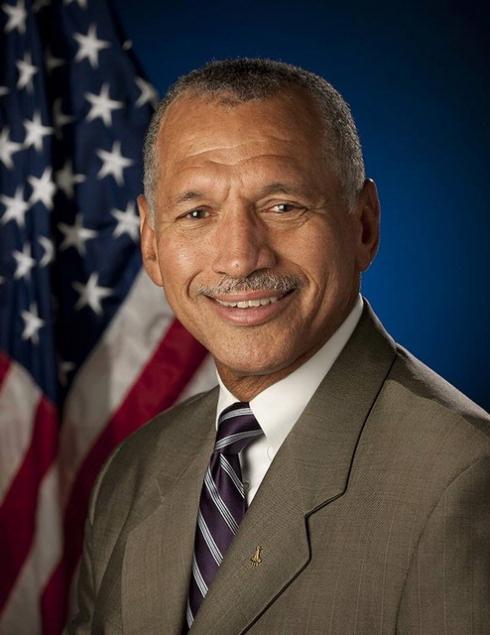
Amy Stamm 202-633-2392 StammA@si.edu
The Smithsonian’s National Air and Space Museum will award its 2019 Trophy to Gen. Charles F. “Charlie” Bolden for Lifetime Achievement. In the category of Current Achievement, the Trophy will be awarded to the LIGO Scientific Collaboration (LSC). The recipients will receive their awards March 26 at a black-tie dinner in Washington, D.C.
Established in 1985, the award recognizes outstanding achievements in the fields of aerospace science and technology and their history. As in past years, Trophy winners receive a miniature version of “The Web of Space,” a sculpture by artist John Safer.
“The winners of the 2019 Trophy have played a significant role in pushing boundaries in aviation and space exploration,” said Ellen Stofan, John and Adrienne Mars Director of the museum. “Both Gen. Bolden and the LIGO Scientific Collaboration have achieved what many felt was impossible.”
2019 Trophy Award Recipients
Bolden will receive the 2019 Lifetime Achievement Trophy for his lifetime of pioneering achievements in both aviation and spaceflight. He has served as a Marine combat aviator in Southeast Asia, a test pilot at the Naval Test Center in Maryland, a NASA pilot astronaut who flew four space shuttle missions, a Marine Corps general in command positions and a NASA Administrator. Bolden grew up in segregated South Carolina and was one of four black midshipmen in the 1968 class at the U.S. Naval Academy. After serving as a combat and test pilot in the Marine Corps, he was selected as an astronaut candidate in 1980. He flew four space flights and logged over 680 hours in space, serving as pilot and then mission commander. On STS-31, he and the crew deployed the Hubble Space Telescope. He commanded the first joint American/Russian space shuttle mission on his last mission.
After leaving NASA, he returned to active duty with the Marine Corps for nine years. He was inducted into the U.S. Astronaut Hall of Fame in 2006 and was appointed by President Barak Obama as the 12th administrator of NASA. As administrator he oversaw the transition from the space shuttle program to an era of ISS utilization and development of new vehicles for human spaceflight beyond Earth orbit. The agency’s science activities under his leadership included the landing of the Curiosity rover on Mars, the launch of the Juno spacecraft to Jupiter and continued progress toward the 2018 launch of the James Webb Space Telescope.
LSC will receive the 2019 Current Achievement Trophy. Using the groundbreaking NSF-funded instrument LIGO, LSC detected gravitational waves, heralding a new age of multi-messenger astronomy. In August 2017, LSC with sister facility and collaboration Virgo, achieved the first-ever detection of colliding neutron stars, called a kilonova. Astronomers detected the collision with both gravitational waves and light, marking the first time anything has ever been observed with both kinds of detectors. Before 2017, a kilonova had previously only been theorized. Now it has been studied, and the LSC’s observations confirmed some of those theories. For example, the mergers of neutron stars are now known to be the source of much of the gold, platinum and uranium in the Universe, as well as other heavy elements. These discoveries were truly a collaborative achievement with involvement from approximately 15 percent of all astronomers.
More information about the National Air and Space Museum Trophy and a complete list of past winners are available at Trophy.
The National Air and Space Museum Trophy event is made possible through the support of Atlas Air Worldwide, BAE Systems Inc., The Claude Moore Charitable Foundation, Pratt & Whitney and Sierra Nevada Corp.
The National Air and Space Museum building on the National Mall in Washington, D.C., is located at Sixth Street and Independence Avenue S.W. The museum’s Steven F. Udvar-Hazy Center is located in Chantilly, Virginia, near Washington Dulles International Airport. Both facilities are open daily from 10 a.m. until 5:30 p.m. (closed Dec. 25). Admission is free, but there is a $15 fee for parking at the Udvar-Hazy Center.
# # #